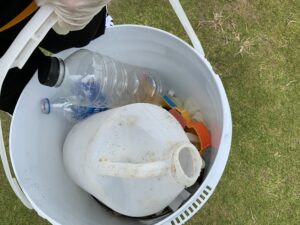A common symbol that can be seen on garbage bags, dump trucks and trash cans is of recycling. The phrase ‘Reduce, Reuse, Recycle’ is taught to children all over the world in the hope of creating a clean environment. We all know that recycling is a simple way in which every person can contribute to making a better world.
However, surely there must be more benefits of recycling than just reducing the amount of trash we throw out. After all, it takes time and effort to collect, separate and send away the trash. But the fact is that there are many ways in which this process makes for a better and happier world.
Is Recycling Important For the Environment?
Recycling is really important. By recycling, we are making new products from the old products which are usually thrown away, it is good for the environment. If waste is not recycled, it will fill up our landfills, end up on our oceans and negatively impact our environment.
1. Recycling helps protect the environment
The manufacturing of new materials from raw materials requires extracting them from mining, quarrying and logging. It also requires refining and processing of these raw materials, all of which create substantial air and water pollution.
Recycling reduces the need for extraction as manufacturers do not have to look for new materials. They simply reuse old, recycled ones to create new ones. It not only saves energy but also reduces greenhouse gas emissions, which helps to tackle climate change.
2. Recycling reduces pollution
Chemicals, plastics, glass, cans all can create water, air, and land pollution. Recycling these materials helps our environment a lot. Instead of throwing your waste away recklessly, it is good to consider if it can be recycled to make new products
3. Recycling is environment-friendly
Trees play a big role in keeping Mother Nature alive. However, every single day trees are cut down to make paper and more paper. Recycling of paper helps in restoring forests, thus protecting our environment. Many paper manufacturing companies recycle paper to reduce deforestation and conserve the environment.
4. Global warming
The continuous greenhouse gas emissions in the air contribute to global warming and, therefore, climate change. Recycling plays a big role in minimizing global warming. Improper waste disposal emits different gases like carbon dioxide, nitrogen, and sulfur, which contribute to global warming. As the recycling process involves minimal waste disposal, burns little fossil fuels and most chemicals are reused, there is less emission of greenhouse gas.
5. Recycling is crucial for Protecting ecosystems and wildlife
Waste can impact animals and, consequently, humans because of the food chain. Waste can contribute to negative impacts like climate change and global warming, which can destroy animals’ natural habitats. When animals and other biological organisms lose their habitats, they can die off or starve. Plastics can also end up in our oceans, break down (micro-plastics) and marine life can feed on it. This micro-plastic eventually ends up in our food when we eat fish.
Raw materials often come from our most important forests, like rainforests that include natural resources like timber, water, and minerals. Recycling helps cut back on new materials and thus preserve natural habitats, forests, rainforests, and give the Earth a chance to grow and heal.
The Incredible Benefits of Recycling
1. Reduce the Size of Landfills
One of the biggest reasons why recycling has been promoted is that it does slowly decrease the size of our landfills. As the population grows, it will become difficult for the landfills to hold so much trash. When this happens, our cities and beautiful landscapes will face pollution, poisoning and many health problems. The benefits of recycling are that it helps to keep the pollution in check and decrease it little by little.
2. Conserve Natural Resources
Scrap cars, old bottles, junk mail and used rubber tires are becoming common features of our landfills. All of these may seem endless, but the resources required to make them are finishing off quickly. Recycling allows all of these junk items to be used over and over again so that new resources do not have to be exploited. It conserves natural resources such as water, minerals, coal, oil, gas and timber.
3. More Employment Opportunities
While you may feel that recycling is each person for himself, in reality, it is a huge industry within itself. After you do the basic sorting out and deposit your trash for recycling, it has to be sorted and shipped off to the right places. This is done by thousands of workers, who are newly employed by the growing industry.
Certainly, one of the major benefits of recycling is that it creates more jobs in the community and provides stability to the entire process. Throwing the trash away creates some six to seven jobs at best, where recycling can help create close to thirty jobs.
4. Offers Cash Benefits
Recycling is not all about being charitable and doing what is good for the environment. If it were so, everybody would recycle out of the goodness of their hearts. Some governments have policies in place which give financial benefits to those who recycle. People that take the aluminum cans or glass bottles to the recycling plant get cash benefits in return. In fact, many teenagers can pick up recycling as a way to make extra money on the side. Old newspapers, appliances, plastic, rubber, steel, copper and even beer cans can be sold for money.
5. Saves Money
An unexpected place where the benefits of recycling can be seen is our economy. A strong economy is one that is efficient in nature. Recycling can help save resources that are growing scarce in the country. When the economy does not have to pay for planting more forests, mining iron ore or purchasing fossil fuels from other countries, recycling really counts. As the cost of maintaining the current waste disposal system goes down, all the money saved is diverted to where it is needed the most.
6. Reduce Greenhouse Gas Emissions
When you recycle products, you tend to save energy, which results in less greenhouse gas emissions. Greenhouse gases are primarily responsible for an increase in global warming. It helps to reduce air and water pollution by cutting down the number of pollutants that are released into the environment.
7. Saves Energy
When you recycle aluminum cans, you can save 95% of the energy required to produce those cans from raw materials, energy saved from recycling one glass bottle is enough to light a light bulb for four hours. This clearly shows how much energy can be saved if recycling is taken on a larger scale. With this, the reliance on foreign oil is reduced, which also helps you to save money in the long run.
8. Stimulate the Use of Greener Technologies
With the use of more recycling products, it has made people want to use greener technologies. The use of renewable energy sources like solar, wind, geothermal is on the rise, which has helped to conserve energy and reduce pollution.
9. Bring Different Groups and Communities Together
At the end of the day, recycling is an act that can bring a community together. Whether it is by picking up trash from the beach or collecting waste materials to raise money for schools and colleges, many simple programs that make a community stronger can be built upon the many benefits of recycling.
Many people have found that their collective efforts in proper waste disposal have made their towns cleaner and happier. Others have found friends and supporters in their mission to change the world. In fact, it is one of the best ways to teach children about responsibility and taking the initiative.
10. Prevents Loss of Biodiversity
Less raw materials are needed when you engage yourself in recycling products. The beauty of recycling is that it will help you to conserve resources and prevents loss of biodiversity, ecosystems and rainforests. When mining activities are reduced, less land is disturbed. Soil erosion and water pollution will be reduced, which in turn will protect native plants and animals from surviving in forests. If recycling is considered seriously by the majority of people, deforestation will significantly reduce.
11. Recycling reduces incineration
When we recycle products, the materials that are recyclable are reprocessed into new products, and as a result, the amount of rubbish sent for incineration reduces.
The benefits of recycling are simple, but the effect they can have is large. This is why so many countries support recycling and make sure that it’s as easy as possible for their citizens to do.



